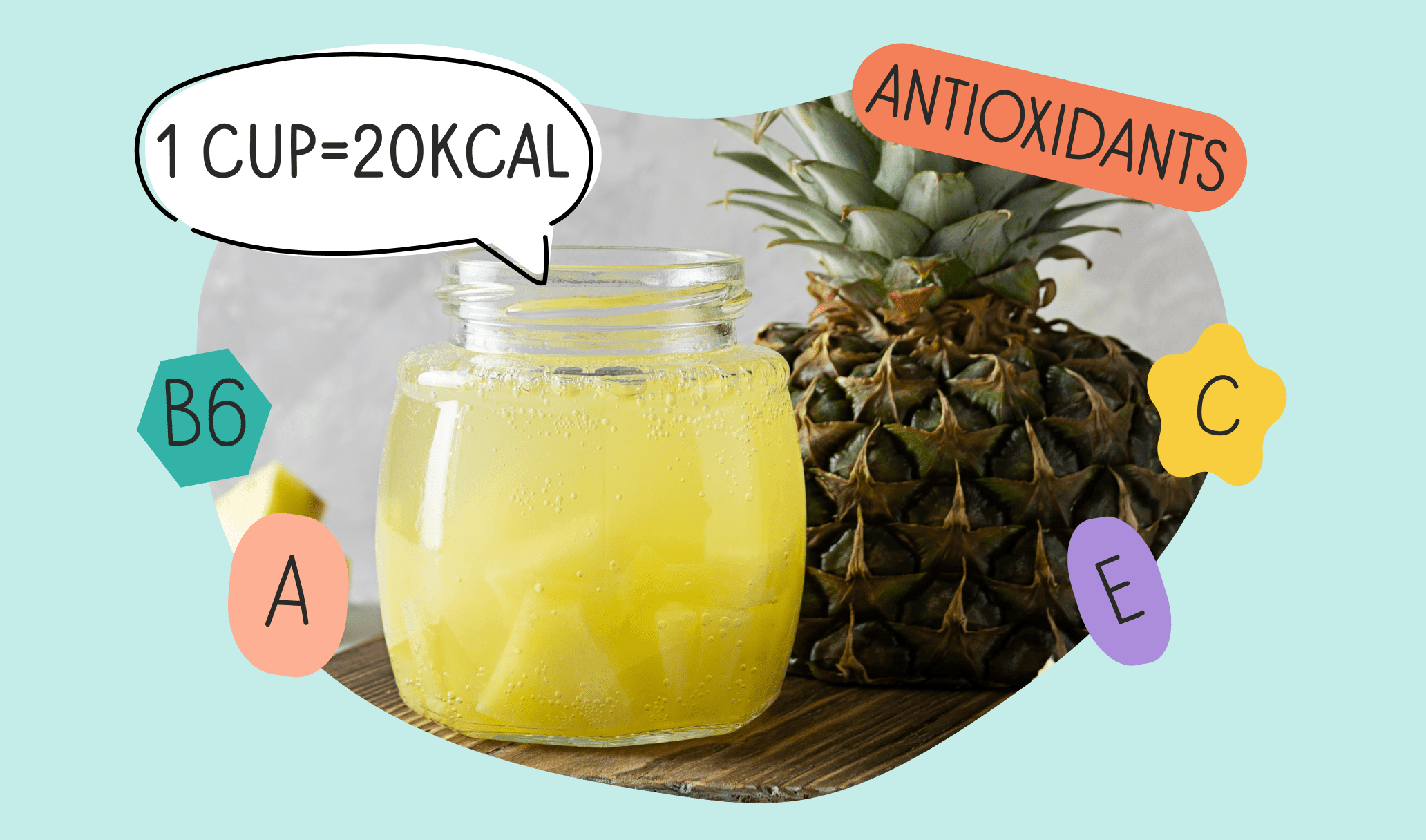In this article, we will share some practical and scientific-based knowledge about pineapple water. Here, you will understand how it influences your body and the weight loss process. You will also learn how to prepare pineapple water in several different ways!
Pineapple water is fruit-infused water that has a slight pineapple taste. It can also contain other ingredients such as ice, mint, cinnamon, or other fruits.
1 cup (250 ml) of pineapple water contains only 20 calories if you eat the pineapples from the bottom. It is a great source of antioxidants such as flavonoids and phenolic acids. It also contains sufficient doses of vitamins A, B6, E, and C1USDA Food Data Central. (2019, April 1). Pineapple, raw, all varieties. U.S. Department of Agriculture. Agricultural Research Service. Retrieved from https://fdc.nal.usda.gov/fdc-app.html#/food-details/169124/nutrients.

You shouldn't expect much from fruit-infused water in terms of its nutritional qualities and active components. But here are some things that you should know about pineapple water.
Pineapple-infused water has certain benefits:

A healthy water balance is definitely a significant advantage to weight loss and your body in general. It can improve your skin condition, sleep quality, digestion, and appetite control. However, it only helps to lose weight when you can maintain a healthy calorie deficit (up to 500 calories a day).
Pineapple water doesn't contribute to weight loss or detox your body if you have poor eating habits. However, you can see results if you replace high-calorie fizzy drinks with pineapple water. Studies have shown that you can effortlessly decrease your calorie intake by 9% (or about 180 calories) if you drink enough water4Muckelbauer, R., Sarganas, G., Grüneis, A., & Müller-Nordhorn, J. (2013, June 26). Association between water consumption and body weight outcomes: a systematic review. The American journal of clinical nutrition. DOI:10.3945/ajcn.112.055061.
Studies suggest that increased water intake can help you lose weight faster. You also burn calories when you digest water, which can slightly increase your metabolism. Drinking water before meals can make you feel fuller and eat less as a result5Van Walleghen, E. L., Orr, J. S., Gentile, C. L., & Davy, B. M. (2007). Pre-meal water consumption reduces meal energy intake in older but not younger subjects. Obesity (Silver Spring, Md.). DOI:10.1038/oby.2007.506.

See also: Healthy Water Intake: How Much Water Should You Drink a Day
The good part about pineapple water is that it is very easy to make. Here are three pineapple water recipes we want to share with you:
See also: Pineapple-mango smoothie recipe
If you want to go with a more sophisticated version, try making it with pineapple peel. You probably throw it away after eating pineapples, but we know how to put it to use. This pineapple water can be served hot, which makes it a perfect winter drink.

Pineapple water is a healthy and diverse drink, but it can be effective only with a high-quality diet and sleeping. Certainly, it can be a part of your healthy lifestyle, but don't expect any miracles! Although it has certain health benefits, most of them come from drinking enough water. If you quit eating junk snacks and replace them with pineapple water, it is more likely that you will lose weight. Try preparing pineapple water in different variations, don't be afraid to add other ingredients, and remember that you can always invent your own perfect formula for this drink.
Unimeal does not diagnose or suggest treatments. Any description of the diet, training plan or supplement should be discussed with your current physician or nutritionist. This article does not address specific conditions and is simply meant to provide general information on healthcare topics. Following any advice is at your own initiative and does not impose any responsibility on the blog authors for your health and safety.
Sources:
By choosing high-quality sources, we make sure that all articles on the Unimeal blog are reliable and trustworthy. Learn more about our editorial processes.
1.
2.
3.
4.
5.
Related Articles